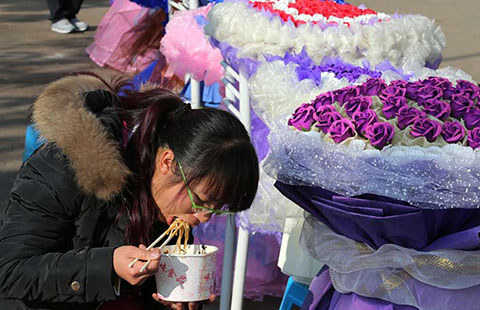More Chinese grads turn to Japanese IT firms
(Xinhua) Updated: 2012-09-06 13:27TOKYO - More and more young graduates from Chinese universities have joined their counterparts from neighboring Asian countries in seeking employment in Japanese firms, particularly in the IT sector.
But Yang Tao, a postgraduate student from Tsinghua University does not seem to be very optimistic about his prospects of being hired after his first round of job interview at DeNA, a leading Japanese Internet company in Tokyo.
"The interviewers asked me some technical questions. I didn't prepare enough for this part, I failed to give the best answer," Yang said in an interview with Xinhua.
Yang Tao is one of the finalists of a global recruiting project for Japanese IT industry called "Work in Japan" organized by RGF, the biggest Japanese HR service company.
RGF recently held a computer programming competition for graduates from top universities in China, South Korea and India. It has selected a total of 92 graduates, including 85 Chinese, from over 10,000 applicants and brought them to Tokyo for job interviews in Japanese companies.
The project planner Shuhei Miyatake told Xinhua that Japan- based IT companies, aiming to expand their global businesses, have strong demand for engineers who are willing to work both in Japan and abroad. He said local graduates are not enough to meet the growing needs.
Compared with Japanese graduates, Chinese students not only have high technical skills and real-work experiences but also stronger determination and Confucian work ethics, qualities that are most needed by Japanese companies.
"What we do is to pick talents from China, and recommend right people to the right companies," Miyatake said.
Based on their individual interests, the young graduates from China and elsewhere were invited for one week in Tokyo for job interviews in IT companies, such as DeNA, NTT and Rakuten.
RGF, which began recruiting Chinese workers in 2010, has already brought about 140 Chinese graduates into Japanese companies where they have been welcomed and highly-admired for their skills.This time, RGF organized another interview in a bid to recruit the best Chinese talents to work in Japanese companies.
Wei Enxun, the first prize winner of the computer programming competition from Shanghai Jiaotong University, told Xinhua that in his opinion, the work environments are similar in big cities all over the world. "To find a job abroad is not just a challenge for me but is also an opening for more opportunities," Wei said.
Kazuaki Mihara, the HR manager of DeNA, who interviewed Yang Tao, said DeNA's business is growing rapidly in China, so DeNA wants to attract more people who are familiar with the Chinese market and Chinese culture.
"It's been our fourth year in hiring Chinese workers but this was the first time that we held special interviews for Chinese students at our headquarters in Tokyo," Mihara said.
He said that some Chinese students were worried about their prospects but he assured them that DeNA will give equal opportunity to all applicants, adding that the most important thing that DeNA wants is the work ability of the prospective employee.
According to RGF's research, nearly 30 percent of the Japanese firms employing more than 5,000 people want to hire foreign employees.
As the backbone enterprises in Japan are expanding their production and marketing in Asia, the demand for foreign workers has increased correspondingly.
Miyatake said that out of the 92 Chinese graduates interviewed, about 30 percent of them will finally join the IT workforce in Japan.
As for Yang, all is not lost yet. "I know more about DeNA after the interview, if I could get the job, I wish to realize my dream here," he said.
- Cash-rich Chinese firms urged to take acquisition trail to Japan
- Japan, China to promote energy-saving projects
- 'Conditions right' for China, Japan FTA
- China's shifting economy promises benefits to Japan
- Consumption promises to benefit Japan
- Education system producing too few technical graduates
- More new grads opt for State firms
- China's new yuan loans soar in January
- WeChat to charge fees for digital wallet transfers to bank accounts
- China-Russia Expo to be held in Russia in July
- Myanmar-China bilateral trade hits over $9b in 10 months of 2015-16 FY
- China suspends oil price adjustment again
- Chinese investors seeking shelter in yellow metal
- Southern Publishing surges in trading debut
- Former general manager of China Southern Airlines under probe
















